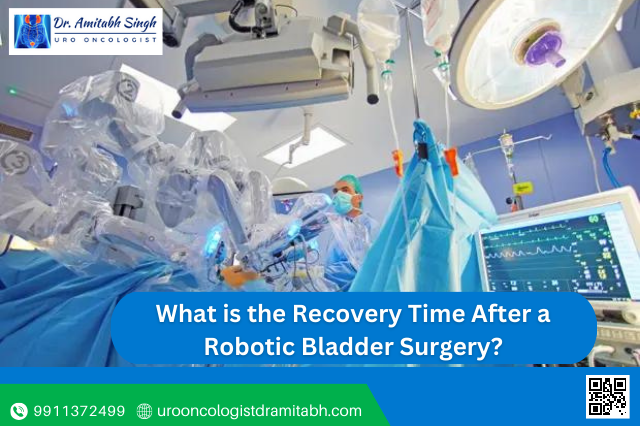- November 29, 2023
- By: oncologistdramitabh
What is the Recovery Time After a Robotic Bladder Surgery?
Overview:
A robotic cystectomy is a modern way of treating bladder cancer by removing part or all of the bladder. This is commonly done when there is bladder cancer that has spread to the muscle wall. Instead of a large incision, smaller cuts are made, making it less invasive than traditional open surgery.
Robotic surgery is one of the recent advancements in treating cancers. Robotic cystectomy benefits from the robot’s arms and allows for greater flexibility than traditional laparoscopic methods. The robot also gives the surgeon a clear, detailed 3D view inside the abdomen, making the surgery more precise and effective. This kind of robotic surgery is a recent and helpful way to treat bladder issues, especially for those looking for a robotic surgeon for bladder cancer in West Delhi.
Immediate Postoperative Period:
After robotic bladder surgery, patients are typically monitored closely in the recovery room before being transferred to a hospital room. The initial 24 to 48 hours are crucial for assessing vital signs, managing pain, and ensuring the absence of any immediate complications. During this period, patients may have two to three tubes coming out of abdomen to drain urine and collected fluid at surgical site. These tunes helps patients to recover fast.
Hospital Stay:
The length of hospital stay following robotic bladder surgery can vary based on individual factors and the complexity of the procedure. On average, patients may stay in the hospital for approximately 3 to 10 day. The robotic surgeon for bladder in Rohini will monitor the patient’s progress, provide pain management, and gradually reintroduce normal activities.
Recovery Milestones:
Catheter and drain tube removal: The removal of the urine tube and abdominal drain tube is a significant milestone in the recovery process. This typically occurs a week or two after surgery, depending on the surgeon’s recommendations and the patient’s progress.
Mobility and Activity: While rest is essential during the initial recovery phase, patients are encouraged to gradually resume light activities and mobility as advised by their robotic urosurgeon. Walking and gentle movements aid in preventing complications such as blood clots in calf and leg and promote overall well-being.
Dietary Progression: Initially, a patient’s diet may be limited to easily digestible liquids, gradually progressing to solid foods. A balanced and nutritious diet is crucial for optimal healing and recovery.
Follow-up Appointments: Regular follow-up appointments with the robotic urosurgeon in Delhi, especially in Rohini, are integral to track the patient’s progress. These appointments allow for the assessment of any lingering concerns, adjustment of medications, and the provision of guidance on resuming normal activities.
Resuming Normal Activities: Depending on the complexity of the surgery and individual healing rates, patients can usually resume normal activities within 4 to 6 weeks postoperatively. However, strenuous activities and heavy lifting may need to be avoided for a more extended period.
Conclusion:
Robotic bladder surgery, facilitated by skilled robotic urosurgeons in Delhi, particularly in Rohini, offers patients an innovative and effective solution for bladder conditions. Understanding the recovery process is vital for patients to actively participate in their healing journey and achieve optimal outcomes. With the guidance of experienced robotic surgeons, individuals can navigate the road to recovery with confidence, reclaiming their health and quality of life. To enhance accessibility to comprehensive care, consider scheduling an online cancer specialist appointment for a seamless and efficient consultation process.


